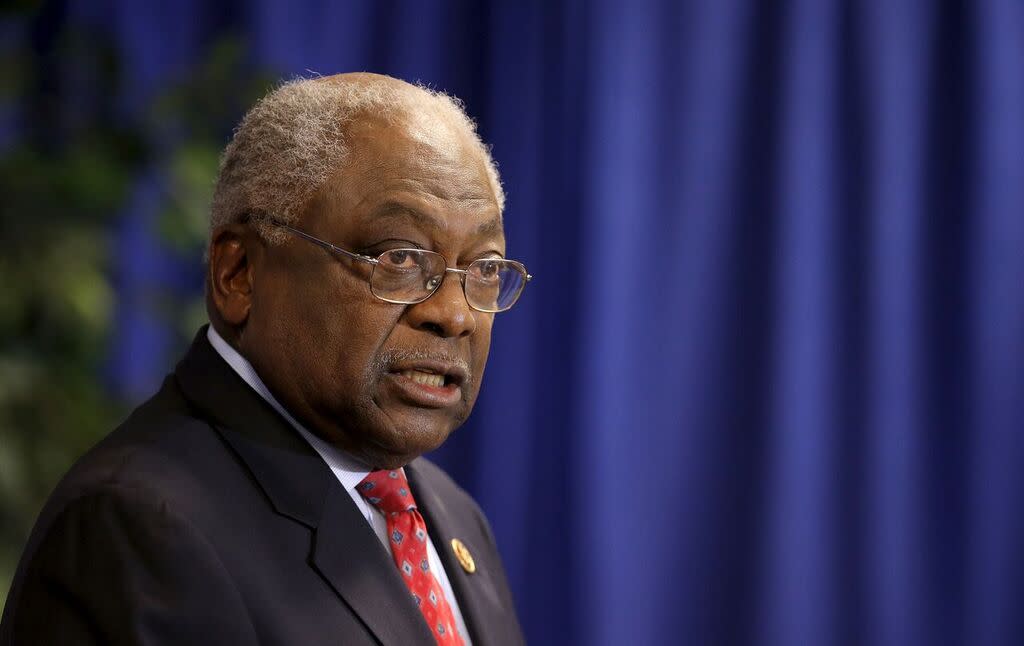Powerful Rep. Jim Clyburn explains why he chose Clinton

U.S. Rep. Jim Clyburn addresses a press conference at Allen University in Columbia, S.C., on February 19, 2016, at which he endorsed Democratic presidential candidate Hillary Clinton. (Photo: Chris Keane/Reuters)
COLUMBIA, S.C. — Rep. Jim Clyburn, D-S.C., gave a major boost to Hillary Clinton in his home state when he endorsed her presidential bid, going back on his original plans to stay neutral in the race until after his state holds its primary on Saturday. On Tuesday, Clyburn explained the reasons for his change of heart.
Clyburn, a former chair of the Congressional Black Caucus, and the third-ranking Democrat in the House of Representatives, endorsed Clinton on Feb. 19. Clyburn is a popular figure in South Carolina’s sizable African-American community. The Clinton campaign described Clyburn’s support as a “momentous” coup on the day he announced his decision. But according to Clyburn, her rival, Sen. Bernie Sanders, D-Vt., never tried to win his support.
“I spoke with Bernie before he announced. He and I sat down in Washington, and he told me he was going to run, and I wished him well. I’ve talked to him several times since then … but he never asked me for an endorsement, and so I never considered giving one,” Clyburn said in a press conference call with reporters on Tuesday.
Clyburn went on to say that he does not believe Sanders is “as prepared to be the next president as Hillary Clinton.” He also suggested he has some policy differences with Sanders. Specifically, he cited the “10-20-30 initiative,” a plan he has pushed that would direct at least 10 percent of funds in three rural development accounts to rural counties that have had poverty rates of at least 20 percent for 30 years.
“Hillary Clinton has studied that proposal, and she has bought into it, and the Department of Agriculture now has picked up on that proposal and is using it throughout the country. I have not been able to get buy-in on that from the Sanders campaign, and I don’t know quite why,” Clyburn said. “I just believe that we are never going to close any poverty gap that we all talk about, if we do not direct these resources to where they’re needed.”
Sanders has made income inequality a focus of his presidential campaign. He has also called for free tuition at public colleges. Clyburn said he also has concerns about this plan, which he says could hurt attendance at historically black colleges and universities.
“I have not been able to get the Sanders camp to modify his approach to this and to do it in such a way that will protect historically black colleges and universities,” he said.
The Sanders campaign did not respond to a request for comment from Yahoo News about Clyburn’s policy concerns, or as to whether Sanders had sought the congressman’s endorsement.
In November, Clyburn indicated he would not make an endorsement ahead of South Carolina’s Democratic presidential primary, which is scheduled for Saturday. He said he would stand by the position of neutrality he has held since the 2008 cycle, when he said he wanted to avoid tipping the balance for one candidate as South Carolina moved its primary up to an earlier position in the calendar. On Tuesday, Clyburn suggested that it was his wife who had influenced him to change his plans.
“Well, I’ve been married for 54 years … and when your wife of 54 years says: ‘I’m getting phone calls, people are talking to me in the beauty shop, people are stopping me at the grocery store,’ and then she looks at me and [says] ‘I want to hear from you as well,’” Clyburn said.
“So, I decided that I would wait until as late as I possibly could and endorse because … my wife told me that she wanted to hear from me, and I’ve been getting a lot of phone calls from a lot of people.”
Clyburn also suggested to anyone concerned about his endorsement ahead of the South Carolina primary that they should not worry about it happening again.
“I’m 75 years old, so I doubt very seriously… If anybody would worry about me doing this again in the future, it would be somebody else,” Clyburn said.

